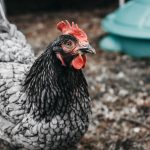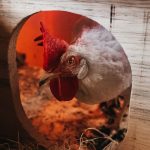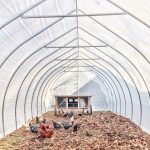Chickens have specific requirements that must be met for their well-being, particularly during winter. A warm, dry environment is essential to protect them from cold and damp conditions. Fresh water and nutritious food are necessary to maintain their energy levels and body heat.
Proper ventilation in the coop is crucial to prevent moisture and ammonia buildup, which can cause respiratory problems. Signs of cold stress in chickens include decreased egg production, lethargy, and huddling together for warmth. To ensure their health and comfort, it’s important to provide an adequately insulated coop that protects them from harsh winter weather.
The coop should be free from drafts and leaks, and contain dry, clean bedding material. Chickens are sensitive to temperature changes and can suffer from cold stress if their environment is not properly maintained. Understanding their natural behaviors, such as roosting together for warmth, is important when creating a suitable winter habitat.
Providing sufficient roosting space for all birds is essential. By addressing these needs, chicken owners can create a safe and comfortable environment for their flock to thrive during the winter months.
Table of Contents
- 1 Creating a cozy and insulated coop
- 2 Providing extra bedding and nesting materials
- 3 Using heat lamps and heaters safely
- 4 Ensuring proper ventilation
- 5 Offering warm and nutritious food and water
- 6 Monitoring the health and behavior of your chickens
- 7 FAQs
- 7.1 What are the best ways to keep chickens warm in winter in the UK?
- 7.2 How can I insulate my chicken coop for winter?
- 7.3 Is it safe to use heat lamps or heated pads for chickens in winter?
- 7.4 How can I ensure good ventilation in the chicken coop during winter?
- 7.5 What should I feed my chickens to help keep them warm in winter?
Key Takeaways
- Chickens need extra care in winter to stay warm and healthy
- Insulate the coop with materials like straw and foam boards to keep the cold out
- Provide plenty of bedding and nesting materials for chickens to snuggle into
- Use heat lamps and heaters with caution to prevent fires and burns
- Proper ventilation is crucial to prevent moisture buildup and respiratory issues
- Offer warm and nutritious food and unfrozen water to keep chickens well-nourished
- Monitor your chickens’ health and behavior regularly for signs of cold stress or illness
Creating a cozy and insulated coop
Insulation and Bedding
Insulating the coop is crucial for retaining heat and keeping the interior warm during the winter months. Using materials such as straw, hay, or wood shavings as bedding provides an additional layer of insulation and helps to keep the coop dry. These materials are effective in preventing moisture buildup and keeping the coop warm.
Sealing Gaps and Ventilation
Sealing any gaps or cracks in the coop walls and windows is essential to prevent drafts and keep the interior warm. However, it’s equally important to ensure that the coop is well-ventilated to prevent the buildup of moisture. A well-ventilated coop will maintain a comfortable temperature for your chickens while preventing moisture-related issues.
Roosting Space and Coop Placement
Providing a cozy environment for your chickens also involves ensuring they have enough space to roost comfortably. Chickens naturally roost together for warmth, so providing ample roosting space will allow them to huddle together and stay warm during the winter nights. Additionally, positioning the coop to receive maximum sunlight during the day can help to naturally warm the interior and provide additional warmth for your flock.
Providing extra bedding and nesting materials

During the winter months, it’s important to provide your chickens with extra bedding and nesting materials to keep them warm and comfortable. Bedding materials such as straw, hay, or wood shavings provide insulation and help to retain heat in the coop. These materials also absorb moisture and keep the coop dry, which is essential for preventing cold stress in chickens.
Additionally, providing nesting materials such as straw or shredded paper in the nesting boxes will help keep your hens warm while they lay their eggs. By providing extra bedding and nesting materials, you can ensure that your chickens have a cozy and comfortable environment to rest and lay eggs in during the winter. In addition to providing extra bedding, it’s important to regularly clean and replace the bedding in the coop to maintain a dry and hygienic environment for your chickens.
Wet or soiled bedding can lead to cold stress and respiratory issues in chickens, so it’s crucial to keep the coop clean and dry. Providing ample bedding also allows your chickens to burrow and nestle into it for warmth, which is essential for keeping them comfortable during the winter months. By providing extra bedding and nesting materials, you can help your chickens stay warm and cozy throughout the winter.
Using heat lamps and heaters safely
Using heat lamps and heaters safely can provide additional warmth for your chickens during the winter months. However, it’s important to use these devices with caution to prevent fire hazards and ensure the safety of your flock. When using heat lamps or heaters, it’s crucial to position them securely and out of reach of your chickens to prevent accidental burns or fires.
Additionally, using devices with built-in safety features such as automatic shut-off switches can help prevent overheating and reduce the risk of fire. It’s also important to regularly inspect and maintain heat lamps and heaters to ensure that they are functioning properly and safely. Another important consideration when using heat lamps or heaters is to provide alternative sources of warmth for your chickens.
This can include providing additional bedding, insulating the coop, or using heated waterers to prevent freezing. By providing alternative sources of warmth, you can reduce the reliance on heat lamps or heaters and minimize the risk of fire hazards. It’s also important to monitor the temperature in the coop regularly to ensure that it remains at a comfortable level for your chickens.
By using heat lamps and heaters safely, you can provide your chickens with additional warmth during the winter months while minimizing potential risks.
Ensuring proper ventilation
Proper ventilation is crucial for maintaining a healthy environment for your chickens during the winter months. While it’s important to keep the coop warm and insulated, it’s equally important to ensure that there is adequate ventilation to prevent the buildup of moisture and ammonia. Poor ventilation can lead to respiratory issues in chickens, so it’s essential to provide a well-ventilated environment while still maintaining a comfortable temperature.
This can be achieved by installing vents or windows in the coop that can be opened or closed as needed to regulate airflow. It’s also important to regularly clean and remove any soiled bedding or droppings from the coop to prevent the buildup of ammonia. In addition to providing proper ventilation in the coop, it’s important to consider the placement of waterers and feeders.
Placing these items away from roosting areas can help prevent moisture buildup in the coop and maintain a dry environment for your chickens. It’s also important to regularly inspect the coop for any signs of condensation or moisture buildup, as this can indicate poor ventilation. By ensuring proper ventilation in the coop, you can provide your chickens with a healthy and comfortable environment to thrive in during the winter months.
Offering warm and nutritious food and water

Nutritious Food for Energy
Offering warm and nutritious food is essential for keeping your chickens healthy and energized during the winter months. Chickens require additional energy to stay warm in cold weather, so providing them with high-quality feed that is rich in protein and nutrients is crucial. This can include offering supplemental treats such as mealworms, cracked corn, or sunflower seeds to provide extra energy for your flock.
Warm Water for Hydration
Additionally, providing warm water for your chickens is essential for preventing dehydration and maintaining their body temperature. Using heated waterers or regularly replacing frozen water with fresh warm water can help ensure that your chickens have access to clean and warm water throughout the winter.
Feeding Schedule and Monitoring
In addition to offering warm food and water, it’s important to consider the feeding schedule for your chickens during the winter months. Providing additional feedings throughout the day can help keep your flock energized and maintain their body heat. It’s also important to monitor their food intake and adjust their diet as needed based on their energy levels and overall health.
By offering warm and nutritious food and water, you can help your chickens stay healthy and comfortable throughout the winter.
Monitoring the health and behavior of your chickens
Monitoring the health and behavior of your chickens is crucial for identifying any signs of cold stress or illness during the winter months. It’s important to regularly observe your flock for any changes in behavior or appearance that may indicate health issues. This can include monitoring their activity levels, appetite, egg production, and overall demeanor.
Additionally, checking for any signs of respiratory issues such as coughing or wheezing can help identify potential problems early on. In addition to monitoring their health, it’s important to regularly inspect their feet for signs of frostbite or injury due to cold weather conditions. Providing additional protection such as applying petroleum jelly on their combs or wattles can help prevent frostbite in extreme cold temperatures.
It’s also important to be aware of any signs of aggression or bullying within your flock, as this can indicate stress or discomfort among your chickens. By monitoring the health and behavior of your chickens regularly, you can identify any potential issues early on and take appropriate measures to address them. This can include providing additional warmth, adjusting their diet, or seeking veterinary care if necessary.
By staying attentive to their needs, you can ensure that your chickens stay healthy and comfortable throughout the winter months. In conclusion, understanding the needs of chickens in winter involves creating a cozy and insulated coop, providing extra bedding and nesting materials, using heat lamps and heaters safely, ensuring proper ventilation, offering warm and nutritious food and water, and monitoring the health and behavior of your flock. By addressing these needs, you can help your chickens stay healthy and comfortable throughout the winter months while ensuring their well-being is prioritized.
If you’re looking for more tips on keeping your chickens warm in the winter in the UK, you might want to check out this article on how to insulate your chicken coop. It offers helpful advice on how to make sure your chickens stay cozy and comfortable during the colder months.
FAQs
What are the best ways to keep chickens warm in winter in the UK?
In the UK, the best ways to keep chickens warm in winter include providing a well-insulated coop, using heat lamps or heated pads, and ensuring good ventilation while avoiding drafts.
How can I insulate my chicken coop for winter?
To insulate a chicken coop for winter in the UK, you can use materials such as straw, hay, or wood shavings on the floor, and add insulation to the walls and ceiling. This helps to retain heat and keep the coop warm.
Is it safe to use heat lamps or heated pads for chickens in winter?
It is safe to use heat lamps or heated pads for chickens in winter, as long as they are installed properly and used according to the manufacturer’s instructions. It’s important to monitor the temperature and ensure that the coop doesn’t get too hot.
How can I ensure good ventilation in the chicken coop during winter?
To ensure good ventilation in the chicken coop during winter, you can install adjustable vents or windows that can be opened or closed as needed. This helps to maintain air quality while preventing drafts that can make the coop too cold.
What should I feed my chickens to help keep them warm in winter?
In winter, you can feed your chickens a diet that includes high-energy foods such as grains and seeds, as well as providing access to fresh water and occasional treats like warm oatmeal or scrambled eggs. This helps to keep them warm and healthy during the colder months.
Meet Walter, the feathered-friend fanatic of Florida! Nestled in the sunshine state, Walter struts through life with his feathered companions, clucking his way to happiness. With a coop that’s fancier than a five-star hotel, he’s the Don Juan of the chicken world. When he’s not teaching his hens to do the cha-cha, you’ll find him in a heated debate with his prized rooster, Sir Clucks-a-Lot. Walter’s poultry passion is no yolk; he’s the sunny-side-up guy you never knew you needed in your flock of friends!







